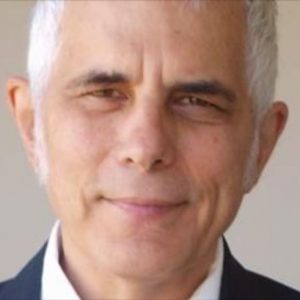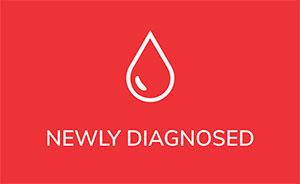
 By Brian Koffman, MD and Chris Fegan, MB, MD, FRCP, FRCPath
By Brian Koffman, MD and Chris Fegan, MB, MD, FRCP, FRCPath
Listen To Audio:
Dr. Fegan and I met at a CLL-AN (CLL Advocacy Network) Horizon Forum in Belgrade, Serbia in November 2016 where we discussed the stress of being diagnosed with leukemia in general and in particular, dealing with “Watch and Wait”.
We at the CLL Society are working with Dr. Fegan and others to perhaps change the paradigm of how CLL is managed and will need your input as we cautiously move forward.
For now, please listen to the interview or read the transcript below as Dr. Fegan lays out the present landscape in CLL.
Dr. Brian Koffman: Hi, I am Dr. Brian Koffman, a family doctor, and a CLL patient, and I am here in Belgrade, Serbia at the first meeting of the CLL AN, the CLL Advocacy Network. Want to introduce yourself, please?
Dr. Chris Fegan: Hello, I am Chris Fegan, I’m a hematologist from the United Kingdom.
BK: Dr. Fegan, you have many areas of interest, but one of your areas is the “watch and wait” and can you explain what that is and why that’s important for patients to understand.
CF: One of the very interesting things in CLL is the amount of research going on. But one of the real areas of unmet needs is, in fact, in the majority of patients, 70% of patients are found by chance and actually don’t necessarily require treatment at all. These patients are told their disease may wake up in the future, it may not, and they’ll just have to wait and see. We may do a bunch of tests called prognostic markers to try to get a better insight into whether the disease is likely to progress, but at the end of the day, the patient walked out not really knowing what’s going to happen to them as an individual. And living with CLL, having been told you’ve got Leukemia but nothing needs doing is a real burden for patients, but co-morbidities come from just the word leukemia and there’s been virtually no research into what it’s actually like for these patients. There’s been some pivotal studies of living with CLL. Half the patients are worrying about their CLL two-years after they’ve been told they’ve got it. They worry on a daily basis because it impacts their life on a daily basis. They worry about their family. They worry about their friends. They worry about their job. They worry about insurance and travel insurance. It impacts enormously on patients, and it’s really not an area of research, and it would be great to have patient’s involvement of what sort of studies they would feel would be appropriate and how it could help them. We’ve got to be able to do better than just giving the patient the label, “here’s Leukemia,” and then say things to them like “it’s not a bad Leukemia to have because nothing may happen to you.” That is absolutely no assistance to patients whatsoever. They’re living with it day-to-day, and the burden that brings with them. In the modern world, as well, with the Internet and everything, the number of drug advances coming along, the patients are bewildered by the sorts of information they can get. They really need to get the right sort of information that’s pertinent to them. And that may not be easy because a lot of the evidence that comes out is driven by commercial pharma companies (I know that’s absolutely wonderful). There really is a role for objective, informed, information for patients and ideally that would come from patients, for patients. So, that people who’ve been through this, and understand that a little bit better about what it’s like to have CLL, can actually assist those people who’ve got it.
BK: The psychological stresses of being told (1) you have a cancer, (2) that it’s incurable, and (3) and we’re not going to do anything about it is just this triple hit for patients that makes it very difficult for them to figure out what’s going on and how to cope with it.
CF: And yes, it comes down to “is my doctor telling me the truth?” sometimes. He just doesn’t want to tell me how bad this is, and so the patient actually walks out of the room thinking that “is the doctor really being honest with me?” or “is he is trying to save from hurting my feelings by actually being kind.” So, from the word “go,” there’s not some sort of misunderstanding, everyone’s telling the truth, but actually what the doctor doesn’t understand is the impact it has on the patient. And the patient really can’t quite understand the words the doctor orders, “do not worry about this, actually because you don’t need treatment.” There’s a lot more to worry about than just treatment. It is as simple as travel insurance – do you write down that you got a cancer? And insurance for a car or high purchases or whatever. And the job, do you tell your boss? Do you tell your children? I have a lot of patients who haven’t told their children they’ve got Leukemia because they don’t want their children to get upset, or get worried. And then living with that, and then they feel guilty because they haven’t told their children. Occasionally their children find out and the children get annoyed because their children want to support their parent. There’s a lot of unsaid things which probably should be said. But every patient is different. Every patient’s circumstance is different. There’s no right or wrong way of doing things and in that 10-15 minute consultation, when you are there with the consulting point, often, once the word Leukemia is used, half the patients they switch off mentally in terms of listening to what’s being told because they’ve just been told something horrific. And we all have an idea of what Leukemia means. From the television, we see programs on Leukemia on the television and its quite often young children, no hair, vomiting away into a bowl. Because that makes really good telly. What doesn’t make good telly is…take these tablets, they are not even chemotherapy, I’ve got to work, I feel absolutely fine, I’ve got no side effects oh and I do have CLL, and my life is absolutely wonderful, and my wife is really happy. In CLL we see all those spectrums from nothing wrong with you, working through, to actually working through modern therapies, to those people who require chemotherapy. Everyone is different.
BK: And, there was some data presented in one of the advocacy sessions on a survey done in 2013 in France by SILLC, the CLL advocacy group in France. And what was very interesting to me is how many patients told their spouse, their children, their friends, and their co-workers and that was a significant percentage, especially when you got to the co-workers who never told them, never told them that they had leukemia.
CF: And they’re worried because in the workplace, if they make mistakes, and we all make mistakes as humans, when people say, “Ah…he shouldn’t be doing this job, he’s got cancer.” And therefore, the whole pressure is on to people to keep it to themselves. It’s almost a dirty little secret that I can’t share with anyone. But actually to cope with this illness, it may be 20 years you live with it and nothing’s happened. You’re making yourself have a less high quality of life by actually keeping that to yourself. But I can understand, fully, why some people would not want some people to be told. They think they’re doing it for the right purposes, but they’re probably not. But when you’re told a diagnosis like this, where do you go to get the right advice of what you should do, and everybody is different. Some children may want to assist their parents and some children may not want to assist their parents with coping with this. Everyone is different. But getting together and find out what actually goes on in the real world, and the study you mention is one of the very few of these sorts of things that is going on, when 70% of our patients are in that group. And I’ve even had some patients say to me, “Oh, thank god, my disease has progressed…I can now have treatment…at last, someone is doing something about it.” And when I hear that, I think to myself, well that’s a failure on my part. How can anyone wish their cancer has grown? It’s just absolutely counterintuitive. That’s a failure on our part that we haven’t actually managed to assist them in that journey of the unknown of what is going to happen to me early on in their disease.
BK: Any final thoughts or anything you want to share with patients about this difficult period of “watch and wait” which is there for almost every patient?
CF: For me, the most important thing is communication with somebody who knows, and if you’re lucky enough to have a doctor you think that you can communicate those things with, then absolutely brilliant. There’s advocacy groups, there’s patient groups, there’s charities, there’s information on the Internet. My advice is for you to do try and get help with it because you will have a much, much, much better time, a much better quality of life, and you will feel better if you actually get assistance. Even though you probably feel that actually you don’t want to be a burden to others – you’re not being a burden to others. There’s lots of people out there who want to help.
BK: And that’s one of the things we try to do at the CLL Society in the support and education groups to help people with this. And there’s actually some evidence that we make a difference at a genomic level because you can turn genes on and off, based on your anxiety, your stress, your lifestyle, so anything we can do to help people cope with that difficult psychological problem may actually have some influence in terms of the course of their disease.
CF: I have no doubt you are absolutely right with that. We know that people that are depressed, their immune system doesn’t function as well, and if you’re depressed, you don’t eat as well. All these things matter in the long run. A lot of patients ask me if there’s anything I can take, doctor, to actually slow it down or whatever, and my usual answer to that is “no,” but if you find something that you actually find helps you, then there’s no problem with having that. (My usual advice is that if you don’t spend too much money on it.) But if you find something that helps you cope with your illness, makes you feel better, absolutely no harm in that at all because what they’re probably doing is boosting their immune system through that process. And the feeling that they’re actively contributing to the management of their illness as opposed to the doctor told me I’ve got Leukemia, don’t worry about it and go away. Patients wants to be involved.
BK: Dr. Fegan, thanks so much for what you’re doing. Not for just your patients in front of you, but for the CLL community. Thanks so much.
CF: All the very best, Brian.
Dr. Brian Koffman, a well-known doctor, educator and clinical professor turned patient has dedicated himself to teaching and helping the CLL community since his diagnosis in 2005. He serves as the unpaid medical director of the CLL Society Inc.
Professor Chris Fegan MB, MD, FRCP, FRCPath is a Consultant Haematologist in the School of Medicine at Cardiff University in the United Kingdom.
Originally published in The CLL Tribune Q4 2016.

















